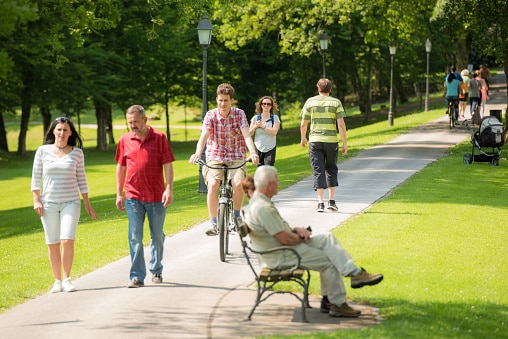In an era where concrete jungles continue to expand, carving out green spaces has become crucial for maintaining a balanced lifestyle. The correlation between proximity to nature and improved health is not merely coincidental but deeply rooted in numerous scientific observations and personal experiences. This comprehensive exploration delves into the multifaceted benefits of being near nature, from bolstering physical and mental health to enhancing social and community dynamics. As the narrative unfolds, it becomes evident that integrating natural elements into your living environments is essential for fostering a healthier, more fulfilling life.
Contents
Physical Health Enhancements

Nature catalyzes physical activity, inviting individuals to walk, jog, and engage in various forms of exercise that are pivotal for maintaining cardiovascular health and overall physical wellness. The accessibility of parks and natural trails encourages a more active lifestyle, directly contributing to reducing obesity rates and related health issues. Additionally, greenery has been linked to improved air quality, significantly lowering the prevalence of respiratory conditions and enhancing lung function. This dual impact of nature on physical health underscores the vital role that natural environments play in fostering a robust and healthy body.
Cognitive Function Boost

Access to nature has significantly enhanced cognitive functions, including attention, creativity, and problem-solving skills. Children’s educational performance and focus improve with regular exposure to outdoor environments, suggesting that nature plays a crucial role in cognitive development. Adults, too, benefit from the mental clarity and increased productivity that natural settings can foster. This cognitive boost is a testament to the power of natural environments in enhancing brain function and fostering a more vibrant intellectual life.
Social Cohesion and Community Well-being

Natural spaces act as communal hubs, fostering social interactions and strengthening community ties. Parks and green areas are recreational spaces and platforms for cultural exchange, communal activities, and social gatherings. These interactions enhance social cohesion, promoting a sense of belonging and collective identity within communities. Moreover, the inclusivity found in shared green spaces enriches social networks and supports the mental health of community members, highlighting the social benefits of living near nature.
Reduction in Noise Pollution

The calmness of natural environments offers a reprieve from the relentless noise pollution characteristic of urban areas. This decrease in background noise contributes to a more tranquil living environment and mitigates the adverse health effects of constant exposure to loud sounds. The tranquility afforded by natural settings facilitates a deeper connection with the environment and oneself, providing a peaceful refuge that promotes mental and emotional well-being.
Enhanced Immune System Function

Regular exposure to nature has been shown to have a significant positive impact on the immune system. This effect is partly due to inhaling phytoncides, natural compounds produced by plants and trees. Phytoncides, such as alpha-pinene and limonene, have antimicrobial properties and are part of plants’ defenses against pathogens.
When humans inhale these substances in forests or green spaces, they can experience the increased activity of natural killer (NK) cells, a type of white blood cell that attacks tumor- and virus-infected cells in the body. Studies have shown that forest bathing trips—spending time in the forest atmosphere—can increase the number and activity of NK cells, with these beneficial effects lasting for several days or even weeks after the exposure.
Mental Health Improvements

The alleviation of stress and anxiety through proximity to natural environments is a key benefit that underscores the therapeutic potential of green spaces. Nature serves as a sanctuary from modern life’s fast-paced, often overwhelming demands, providing a serene backdrop that encourages relaxation and mindfulness.
The psychological relief found in nature is rooted in its ability to offer a sense of space, freedom, and a connection to a world beyond our immediate concerns and routines. Studies have demonstrated that spending time in natural settings can significantly lower cortisol levels, a stress hormone, and improve mood by reducing feelings of anxiety and depression. This calming effect is attributed to the sensory experience of being in nature—the sight of greenery, the sound of running water, and the smell of the earth and plants—all of which contribute to reduced activation of the body’s stress response system.
Furthermore, the role of natural environments in stress and anxiety reduction is increasingly recognized as an important component of mental health care. Encouraging people to spend time outdoors in parks and gardens, in turn, complements traditional therapeutic practices, offering a natural and accessible way to manage stress and anxiety levels. The concept of “ecotherapy” or “green therapy” has emerged, integrating nature-based activities into psychological treatment plans. This approach acknowledges nature’s restorative power and leverages it to enhance emotional resilience and well-being.
Immersion in Natural Beauty Enhances Aesthetic Appreciation

The aesthetic appeal of natural landscapes plays a significant role in enhancing one’s appreciation for beauty and fostering a deeper connection with the environment. This appreciation elevates the spirit and contributes to well-being and happiness.
Immersing oneself in nature’s beauty, whether through witnessing a sunset in a park or observing the intricate patterns of leaves and flowers, can stimulate creativity and inspire a sense of peace and contentment. The ability of natural beauty to touch the human soul underscores the importance of preserving these spaces for ecological balance and enrichment of human culture and individual spiritual growth.
Encouraging Sustainable Living Practices

Living near nature benefits personal health and promotes a sustainable lifestyle. The direct experience of nature’s cycles and systems fosters a deeper understanding of ecological principles and the importance of environmental stewardship. This awareness encourages more environmentally friendly choices, such as conservation of resources, recycling, and supporting local green initiatives. By integrating nature into daily life, individuals are more likely to advocate for sustainable practices and policies, contributing to preserving natural spaces for future generations. The symbiotic relationship between human and environmental health highlights the necessity of living in harmony with nature, where each action taken to preserve the natural world also protects and enhances our well-being.
The Bottom Line
The myriad benefits of living near nature, as explored through physical health, mental wellness, social cohesion, cognitive function, and environmental sustainability, paint a compelling picture of nature’s integral role in human life. The evidence is clear: incorporating natural environments into our urban landscapes and daily routines is desirable and essential for fostering healthy, vibrant communities and individuals. As society continues to grapple with the challenges of urbanization and environmental degradation, preserving and creating green spaces emerge as a critical strategy for enhancing public health and ensuring the planet’s well-being.


